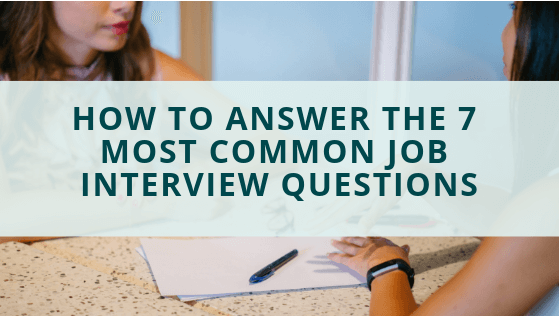How to Answer the 7 Most Common Job Interview Questions
Do you have a job interview coming up?
Congratulations! That’s fantastic news! You submitted a resume, made it through the application process, and landed your first meeting.
So, what are you going to do to impress your interviewers? How are you going to stand out from the rest of the crowd?
If you want to get the job, you’ll need to perform well when you meet your potential boss. This means that you have to give strong responses and leave a lasting impression during the conversation.
Even though you don’t know the questions they’ll ask, you can still prepare. There
are certain questions that pop-up in almost every interview. Being able to answer
those questions will give you an advantage over other applicants.
You’re in luck because we’ve put together a list of the seven most common interview
questions. There’s a good chance you’re interviewer will ask you at least a few of
them.
Read them over, practice how to respond, and you have a much better chance of
getting the gig!
Question #1: Why Are You Leaving Your Current Job?
First up on our list is one of the most dreaded questions:
Why are you leaving your current position?
If there’s any question that will make you sweat bullets, this is it.
After all, you don’t want to talk badly about your previous employer. And, you don’t want them to think you’re that you’re the type of person who looks for an exit as soon as things get stressful.
So, you have to approach this question strategically.
If you’re currently a full-time employee, you should be as honest as possible without talking negatively about the company. Talking poorly about employers shows a lack of maturity and accountability.
Instead, you should focus your answer on yourself (instead of other people). Talk about the fact that you want to grow in your career and take on new challenges that align with your goals. Discuss how the role you’re interviewing for will enable you to do so.
Don’t worry, they probably won’t ask you this question first, but you should be prepared to answer it.
Question #2: Why Do You Want to Work for Our Company?
This question presents an excellent opportunity for you to shine during the interview. It allows you to show your interviewer that you’re passionate about the job, the field, and their company as a whole.
To answer it properly, you need to demonstrate that you’ve done your research and are knowledgeable about their business. They want to know that you want to work with their company specifically and aren’t just seeking a paycheck.
When they ask you this question, you should name a few things that you admire about the organization. These might include:
● Company values
● Reputation
● Development plans
● Specific products
● Positive news about the company
● Specific people who work there and how they inspire you
If you want to answer this question well, you’ll have to do research ahead of time. Read the company’s mission statement, browse the internet for news about them, and look into the projects their working on.
Make sure to touch on the ways that you can add value to their business. The interviewer will be impressed by the fact that you understand their mission and considered how you can help them achieve their goals.
Question #3: How Would You Describe Yourself?
Companies like to hire people who share their values and goals. Interviewers use this question (among others) to determine whether or not you align with their vision for an ideal employee.
Generally, the company talks about what they want from an employee in the job description itself. If you go back and reread the listing, it’s likely that you’ll find a summary of what they’re looking for. You should use this to build your answer.
Of course, you shouldn’t answer this by spitting out random adjectives (hard-working, goal-oriented, loyal, etc). Instead, you should have some examples that illustrate you’re actually the person you say you are.
As opposed to just saying that you’re “ambitious,” for example, you might want to talk about some of your specific goals. Do you hope to be the CEO of a company one day? If so, talk about the steps you’re taking to pursue that ambition.
Remember to approach this question with humility. It’s good to be confident, but cockiness can be a deterrent. Even if you are a smart and talented person, the interviewer will be able to gather this without you having to say it outright.
Question #4: What Are Your Weaknesses?
There’s a reason why this is one of the most notorious interview questions:
It’s very hard to answer.
Even if you’re prepared, it can cause you to stumble.
So, you have to put some serious thought into this one if you want to answer it in a way that doesn’t ruin the rest of the interview.
The best thing you can do is to start from an honest place. Before the interview, think about what your weaknesses are. Ponder over the feedback you’ve received from managers and colleagues in the past and use that as a starting point.
If a boss told you in the past that you need to work on communication skills, for example, you might want to bring that up.
However (and this is the key), you should spin it to discuss the steps you’ve taken to become a better communicator. Hiring managers understand that everyone has flaws. Your weaknesses are less important to them than the fact that you’re constantly working to improve yourself.
When answering this question, it’s far less important what you say than how you say it.
For example, saying something like, “I’m not a naturally good communicator, but I’m working on it,” can be used to your advantage. But, if you just say, “I don’t like working with people,” it could be a deal-breaker.
Question #5: Where Do You See Yourself in Five Years?
If an employer understands how you imagine your life in the future, then they’ll have a good idea of whether your aspirations align with company goals.
To answer, give a broad overview of the skills you’d like to obtain, the type of role you see yourself in, and anything else you want to achieve. You can discuss everything from professional goals to personal goals.
Use this question to show your interviewer that, even if you’ve achieved a lot, you’re focused on learning and self-improvement. Companies want employees who are actively trying to grow alongside the business.
Again, do your research and gain an understanding of the organization’s goals. If you can demonstrate that your values overlap with those of the company, you’ll be in a much better position to ace the interview.
Question #6: Do You Have Any Questions for Us?
If you say no to this question, then you’re in big trouble! You need to have questions for them if you want the job.
Interviewers want to hire someone who is genuinely interested in their company. Questions show that you’re engaged and excited about the possibility of getting the position.
Some questions you may want to ask include:
● What does an average day look like for people in this role?
● What qualities does someone need to thrive in this position?
● What are some of the biggest challenges in this job?
● What are the company’s goals for the next few years?
Also, it’s helpful to ask questions about the interviewer directly. You might inquire about their experience at the company, what they like about their job, and how they achieved their position.
Keep in mind that the interviewer might answer some of your questions during the first part of the conversation. So, make sure to have a range of them in your back pocket to ask in case they’re already answered.
Question #7: What Type of Salary Are You Looking For?
You should never go to an interview without a realistic pay rate in mind.
To figure out what type of salary is appropriate for the job, research how much employees in the same industry are paid. That way, you’ll have a good idea of the salary range.
It’s unlikely that the interviewer will ask you point-blank about your salary requirements. This usually occurs later on if you’re offered the job. But, it’s common for them to ask for a range during the interview to get an idea of whether or not they can afford you.
On the lower end, don’t go lower than you’re actually willing to take. If you change your mind, later on, it may create problems in negotiation.
On the high end, be realistic. Take your experience into consideration. If you’re new to the field, you shouldn’t expect to make as much as someone who’s been doing the same role for years.
Conclusion
Job interviews are overwhelming. But, they don’t necessarily have to be. If you do your research and practice your answers, it’ll be a lot easier for you.
Keep in mind that, when an interview goes well, it feels more like a casual conversation than an interrogation. The interviewer isn’t there to scare you - they’re there to find the best candidate.
So, remain calm and answer the questions as best you can. If you show that you’re an amicable person who can add value to their company, it’s likely that they’ll consider you for the job.
Author Bio:
Ryan Sundling is a Group Marketing Manager at Cardinal Group Management and works closely with Canvas Townhomes to help them with their marketing efforts. He has over ten years of experience in the student housing industry.


